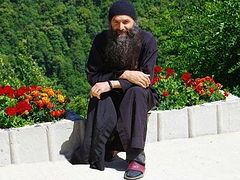During the Nativity Fast, the Church calls upon us to refocus our attention and efforts on the development of our spiritual life. Naturally, this includes an effort to increase our personal prayer life, seeking an internal connection with God, which presupposes the calming of our hearts and the cultivation of inner stillness.
Below we offer a short, but inspiring homily on inner stillness from one of the priests of St. Elisabeth Convent in Minsk
It’s not enough to believe in God—we must believe God. We have to see the providence of God in everything that happens—to see life not as some jumble of random events, but as God’s certain participation in us. And everything depends solely on how we give Him the opportunity to act within us and by us. One man tries to intervene in life’s events, another goes off to Karoulia1 to pray for the world there, another diligently lays stone to build a church, another sings, or serves in church. In all of this, God is all-encompassing, all-seeing, all-knowing, and at the same time, He is humble.
The Lord tells the disciples that they can acquire peace if they imitate His humility: Learn of Me; for I am meek and lowly in heart: and ye shall find rest unto your souls (Mt. 11:29). He doesn’t say: “Do as I do,” although they also healed the sick and raised the dead. But that wasn’t the goal, it was the path—the path to the stillness of the inner heart, which passes through sorrows, rejection, and persecution. And wherever a man is—on Mt. Athos or on a crowded bus—he must try not to be separated from God. Even in a noisy tavern, where music was playing and his friends were drinking, St. Silouan the Athonite was thinking about Mt. Athos. This speaks to the fact that if we want to be with God, nothing can stop us. Probably God wants the same thing. That is, our common desire with Him will be fulfilled if we make an effort, if we allow God to work within us. This is an akathist, the Divine Liturgy and Communion—it is anything man does for the sake of Christ.
When a priest comes out to preach, he says: “In the name of the Father, and of the Son, and of the Holy Spirit.” Then God speaks through his mouth, and everyone hears that which the Lord wants to say to him. But to hear is but the beginning. Then we have to accept what we hear, and then—carry it out. And often, there is a long time between these events. But the time is short. We must hurry yet without haste, so that every day, every hour given us by the Lord, we would try to do His will. There is no more repentance beyond the grave. We choose our path here on earth, and often we wander, returning to the drawing board again and again; again we try to break through the thicket of our thoughts, our laziness, our negligence—to the light. Let us, trusting in God, communicate with Him within our innermost being, without parting.




